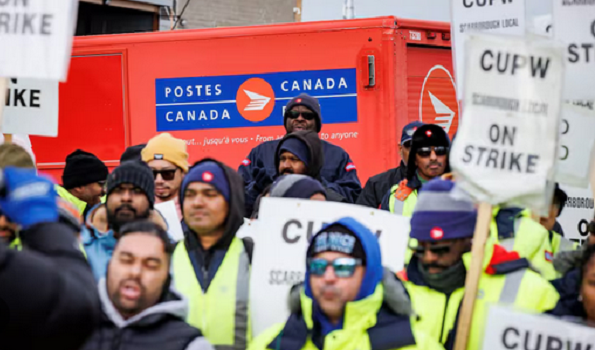Postal workers to stop overtime work, but won’t walk off the job
Canada Post workers won’t be walking off the job even though a last-ditch effort to avoid another strike fell short of what the Crown corporation called “meaningful progress.”
Late Thursday night, the Canadian Union of Postal Workers instead announced that its members would be refusing overtime work beginning at midnight local time across the country.
“While this action does constitute a continuation of our strike activity, postal workers will remain on the job to minimize disruption to the public,” CUPW said in a written statement.
“Canada Post has been working for months to sow fear among employees, businesses, the government and the public about the impact of a disruption. Its actions are driving customers towards competitors including Purolator, of which it owns a 91 per cent stake. Nevertheless, we stand ready to meet Canada Post back at the bargaining table to get the agreements our postal workers and communities deserve.”
Shortly after the union statement, Canada Post said it continues to operate but “customers may experience delays.”
CUPW met with the Crown corporation and a mediator Thursday evening ahead of the midnight deadline, raising hopes after the two sides traded public potshots earlier in the day.
A spokesperson for Canada Post said the union had requested the 7 p.m. meeting, confirming a broadcast report citing the union. But the meeting was short and not particularly productive, the Crown corporation said.
“The meeting lasted less than half an hour with CUPW raising only a small number of the many outstanding issues in an informal manner. It was unfortunately not enough to demonstrate meaningful progress,” Canada Post said in a written statement, adding that the union still hadn’t provided a comprehensive response to a contract offer made on Wednesday.
“We asked them to come back, with urgency, with a response to the Global Offers we presented to the union on May 21,” Canada Post said.
Earlier Thursday, Canada Post said customers have already started bailing in anticipation of another work stoppage.
“Canada Post has already seen parcel and mail volumes decline significantly as customers prepare for another labour disruption. We remain hopeful that negotiations can resume,” the Crown corporation said in a written statement. “Further delays or another strike would have a major impact on employees, small businesses and the millions of Canadians who rely on the postal system.”
CUPW criticized Canada Post’s refusal to accept a two-week truce so the union could take a closer look at Wednesday’s offer, and earlier this week said the Crown corporation was negotiating in bad faith.
Late Wednesday, the union had said Canada Post made details of its contract offer public even before giving it to CUPW negotiators, a move the union said was “yet further evidence of (Canada Post’s) lack of good faith as a bargaining partner.”
The request for a two-week pause may have been a sign of internal division within the union, said Brock University labour relations professor Larry Savage.
“It’s not clear to me that CUPW is sufficiently prepared for another full-scale strike action,” said Savage. “I think the request for a two-week extension was in part to buy the union time to get itself organized to strike effectively. There’s clearly some internal division.”
Public and political patience for a strike has waned after last year’s 32-day walkout, Savage said.
That, he added, could mean the federal government might introduce back-to-work legislation sooner rather than later, if the workers do end up striking.
Prime Minister Mark Carney and federal jobs minister Patty Hajdu would have an incentive to act more quickly than Carney’s predecessor Justin Trudeau, Savage argued Thursday afternoon.
“I do think the federal government took a hit for allowing the strike to drag on as long as it did. And Carney’s also trying to show he’s different than Trudeau,” Savage said.
Wednesday’s four-year contract offer includes the creation of new, part-time carrier job categories to help Canada Post extend parcel delivery to weekends, as well as the use of “dynamic routing” at 10 mail-sorting facilities. Dynamic routing means carriers could see their routes shift daily to accommodate changes in volume.
Canada Post said the offer also includes total wage increases of 13 per cent for existing employees, with a six per cent increase in the first year, followed by increases of three, two and two per cent.
The offer came days after veteran mediator William Kaplan delivered the official report from his Industrial Inquiry Commission to the federal government, including Hajdu.
Kaplan’s report said Canada Post was effectively insolvent, and suggested the use of community mailboxes, the elimination of home delivery except for parcels, and getting rid of some post office locations and replacing them with franchises.
Kaplan also suggested expanding parcel delivery to seven days a week, with the use of part-time and temporary employees.
Kaplan’s report also gives the government political justification for back-to-work legislation, and more importantly, for implementing wholesale changes in Canada Post’s operating model, said Savage.
And CUPW, he added, will need to face that reality, even if they agree to a new contract with Canada Post.
“There are much bigger issues on the horizon that CUPW is going to have to deal with. I think Kaplan’s report will give cover to the government to deal with those broader issues,” Savage said.
Meanwhile, other courier companies are also bracing for a spike in demand in the event of a strike.
“FedEx hopes a resolution is reached between Canada Post and the union,” a FedEx spokesperson said in an emailed statement. “Anticipating that the circumstances at Canada Post may trigger an increase in demand for FedEx services, FedEx has a comprehensive contingency plan to manage and maintain the excellent service our customers have come to expect from us every day.”
This article was first reported by The Star















